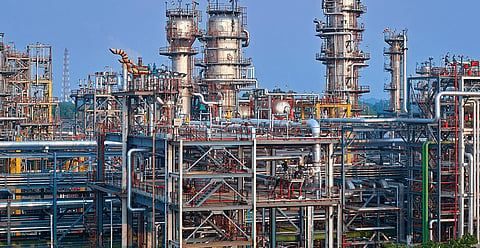

KOCHI: Kochi Refinery, the largest asset of Bharat Petroleum, is set to complete a Rs 6,000-crore PDP complex by this month-end with the commissioning of the last unit that will manufacture niche petrochemical product acrylate, helping the nation save over Rs 4,000 crore in foreign exchange annually.
The Rs 6,000-crore propylene derivatives petrochemical (PDP) complex got delayed by a year due to the pandemic as project engineers from Japanese giant Mitsubishi, the technology and engineering partner of the project, could not travel to the project site in Kochi, forcing BPCL to get most of the project monitoring work done virtually.
The Kochi PDP complex marks the first major endeavour in the country, either in the public or private sector, to produce niche petrochemicals which are predominantly being imported now.
The unit making acrylate -- the key input used by the specialty chemicals, plasticisers and paints and adhesives industries -- is the third and the final unit, planned to be commissioned last June, but got delayed and leading to a cost escalation to Rs 6,000 crore from a little over Rs 5,000 crore for the divestment-bound BPCL.
The company is on course to complete the acrylate unit by the end of this month.
With the commissioning of this unit, the Rs 6,000-crore PDP complex is complete and will help save at least Rs 4,000 crore in import bill annually, Sanjay Khanna, the executive director in-charge of refineries at BPCL, told PTI.
The first unit of the complex was commissioned in February, making it the first unit in the country producing acrylic acid, and the second unit producing oxo-alcohol was commissioned in April this year.
The complex can produce 3.29 lakh kilo tonnes of niche petrochemicals such as butyl acrylate (1,80,000 metric tonnes per annum or mtpa), 10,000 mtpa of ethyl hexyl acrylate, 47,000 mtpa of acrylic acid, 47,000 mtpa of ethyl hexanol and 38,000 mtpa of normal butanol, S Jena, executive director (industrial and commercial) at BPCL told PTI.
Jena said that these products are fully imported but now the end user industries in the specialty chemicals, plasticisers and paints and adhesives segments can save Rs 4,000 crore in foreign exchange annually.
With the commissioning of the PDP complex, BPCL joins the world leaders in this space such as Tasnee of Saudi Arabia, Dow Chemicals of the US, BASF of Germany and Sasol of South Africa, among others, which control the 22 million tonnes market globally.
These six niche products will together replace almost 90 per cent of the imports in this segment, Khanna said.
The unit making acrylic acid -- used in hygienic medical products, detergents, wastewater treatment chemicals, plastics, coatings, adhesives, elastomers, paints and polishes -- is the largest single train unit in the world with capacity of 1.6 lakh mtpa and also the first in the country. "Most of the user industries are primarily in Gujarat and Maharashtra," Jena said.
Normal butanol is second of the six major niche petrochemicals being produced for the first time in the country.
Again, vast majority of the end-customers are in Gujarat and Maharashtra and around 10 per cent in Tamil Nadu, Jena said, adding normal butanol finds application in plasticisers, textiles, impact modifiers for rigid PVC, amino resins and butyl amines.
Annual consumption of normal butanol, predominantly by plasticisers and automotive paint manufacturers, is 60-65 MT, which was mostly imported till now. Kochi Refinery is equipped to produce 38 MT annually. "Over the next few weeks, commercial production of oxo-alcohols and acrylates will also commence," Jena added.
Jena said with the commissioning of the PDP complex, the domestic industry will also gain from price stability and assured supplies in shorter time as imports involve considerable transit time, supply uncertainty and price unpredictability.
On average, the prices will come down by USD 200 from USD 18,000 a tonne. Khanna said the complex took 35 million man days for construction, and will open up more job opportunities with allied industries in the upcoming petrochemical park in Kochi.
BPCL had earlier this month said it had indigenously developed the country's maiden superabsorbent polymer technology, a project which will also come up adjacent to the PDP complex, and which will save Rs 1,000 crore in forex.
The PDP complex will be the feedstock for this complex that will manufacture superabsorbent polymers used in various hygiene products like diapers.
In the first phase, BPCL will set up a small unit with 200 metric tonne capacity to produce superabsorbent polymer at Kochi Refinery, which in the second phase will go up to 50,000 metric tonnes per annum.